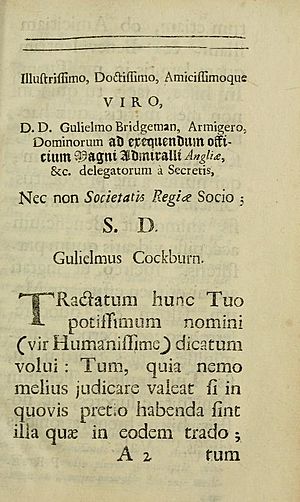William Cockburn (physician) facts for kids
William Cockburn (1669–1739) was a Scottish doctor. He was famous for his special medicine that helped cure a sickness called dysentery. He was also the doctor for the famous writer Jonathan Swift.
Contents
About William Cockburn's Life
William Cockburn studied at the University of Edinburgh. He then went to the University of Leyden in the Netherlands to study medicine in 1691. There, he learned from a doctor named Archibald Pitcairne. Pitcairne's ideas greatly influenced Cockburn's later work.
In 1694, Cockburn became a "licentiate" of the College of Physicians of London. This meant he was officially allowed to practice medicine. Around the same time, he became a doctor for the "Blue Squadron" of the British navy.
Cockburn's Famous Medicine
Working with the navy helped Cockburn share his secret medicine for dysentery. Dysentery is a serious illness that causes severe diarrhea. This medicine made him very wealthy.
One story says that in 1696, he was having dinner on a ship. Someone mentioned that they needed a better way to cure "fluxes," which was another name for dysentery. Cockburn said he thought he could help.
The next day, they tested his medicine on 70 sick sailors on a ship called HMS Sandwich. The medicine worked well! The navy leaders, including Sir Clowdisley Shovell, heard about this success. They decided to buy a lot of Cockburn's medicine, called an "electuary," for the ships in the Mediterranean Sea. Cockburn continued to supply his electuary to the fleet for 40 years.
Life in London
We don't know exactly when Cockburn started his private doctor's practice in London. He became very busy, treating many patients. In 1731, he became a doctor at Greenwich Hospital.
When Jonathan Swift, a famous writer, visited London in 1710, Cockburn was one of the first people he had dinner with. Even though Swift liked other doctors more, he chose Cockburn to be his personal doctor.
William Cockburn passed away in November 1739, when he was 70 years old. He was buried in Westminster Abbey, a very famous church in London.
William Cockburn's Writings
Cockburn's first book, Œconomia Corporis Animalis, came out in 1695. This book talked about the basic rules of how the body works and how diseases start. It showed the ideas of his teacher, Pitcairne, who believed the body worked like a machine. Cockburn dedicated this book to William Bridgeman from the Admiralty. At that time, there weren't many books about health for sailors.
In 1696, Cockburn wrote a smaller book. It was called Nature and Cure of Distempers of Seafaring People. This book also included his thoughts on what sailors in the navy should eat. It was based on his two years of experience as a ship's doctor.
He also wrote Account of the Nature and Cure of Looseness, which was published again in 1710. This book was about treating diarrhea.
Other Works and Debates
In 1699, Cockburn wrote a paper for the Philosophical Transactions of the Royal Society. He later became a member of this important scientific group. His other writings were mostly short papers about his secret dysentery medicine.
One paper, The Present Uncertainty in the Knowledge of Medicines (1703), was a letter to other doctors. In it, he criticized them for having narrow views about medicine. Another paper, The Danger of Improving Physick (1730), was written against other doctors who were his opponents. One of these was John Freind, who had criticized Cockburn in his own book, History of Physick (1725).
Cockburn also translated a Latin book about children's illnesses into English. The original book was written by Walter Harris and Cockburn's translation came out in 1693.
William Cockburn's Family
Cockburn was married two times. His first wife was Mary de Baudisson, a widow. They got married in 1698. Mary passed away in 1728.
In 1729, he married again to Lady Mary Fielding. She was the oldest daughter of Basil Feilding, 4th Earl of Denbigh, and had been one of his patients. There's a story about how they got married: Cockburn found Lady Mary crying because she had to leave London due to money problems. He told her, "Madam, if fifty thousand pounds and the heart of an old man will console you, they are at your service." This meant he offered her a lot of money and his love.
 | Frances Mary Albrier |
 | Whitney Young |
 | Muhammad Ali |


